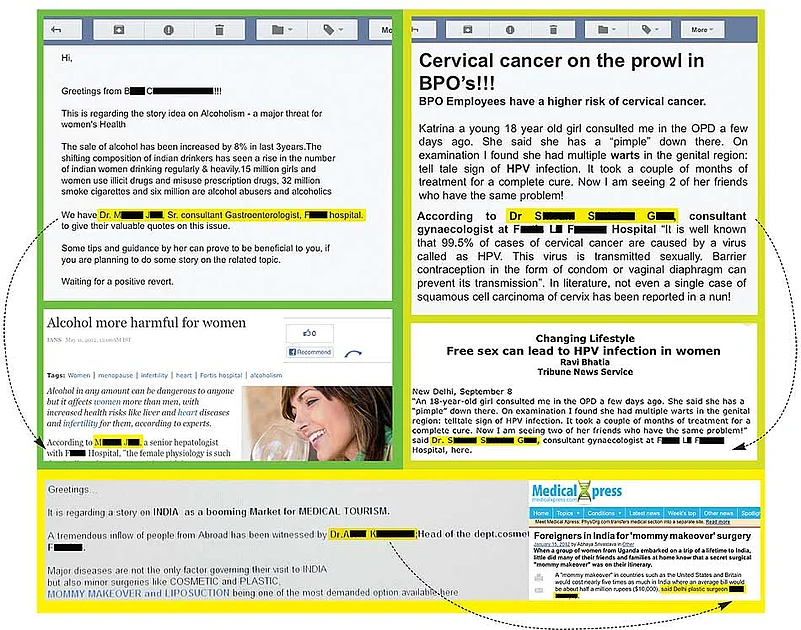No To The Lay Press
Indian Medical Council (Professional Conduct, Etiquette and Ethics) Regulations, 2002
“A physician should not contribute to the lay press articles and give interviews regarding diseases and treatments which may have the effect of advertising himself or soliciting practices; but is open to write to the lay press under his own name on matters of public health, hygienic living or to deliver public lectures, give talks on the radio/TV/internet chat for the same purpose and send announcement of the same to lay press.”
***
Alcohol and tobacco firms have found ingenious means—using bottled water and music CDs—to bypass strict controls on advertising their wares. But are our doctors also now increasingly bypassing similar controls on their profession by having themselves promoted in the media? Growing privatisation of healthcare has led many doctors to believe they can’t do without self-promotion to survive in a competitive market. But, faced with a ban by the Medical Council of India (MCI) from advertising or soliciting clients, doctors have taken to roping in PR firms and have them build their brand through media coverage—all in the name of raising public awareness.
This is a trend that has grown considerably in the past few years, spawning specialist healthcare PR agencies. This throws up worrying questions about healthcare journalism and how doctors are creating markets for their services by contravening MCI norms.
Doctors may defend the use of PR specialists to publicise ‘research findings’ or a new ‘technique’ of treatment but most e-mails sent out to journalists have little to do with either. Instead, publicity is all that they seek, even if what they tout is specious. Like the e-mail sent to journalists from a Delhi-based PR agency about cervical cancer “being on the prowl” in BPOs (based just on three cases from one unnamed office), or insubstantial ones such as protecting hair during season changes or skin during Holi revelries.

How does this elaborate system work? On behalf of the doctors, the healthcare PR agencies approach journalists with “story ideas” where they, or rather their clients, can be featured, sending in frequent releases along with quotes from the doctors. A classic arrangement involves a payment of anywhere between Rs 25,000 to Rs 75,000 by a doctor to an agency to get him mentioned in the media around five times a month. The rates vary according to the journals’ circulation and the cities covered. A national daily in a metro, whether Hindi or English, would be ranked top in the list.
Since advertising is prohibited, the arrangement works just as well for the doctors, perhaps even better, because not only do these stories generate publicity at far lesser costs, they also appear to be more credible. As Sakshi Arora Valecha, whose firm Blink Communications handles 15 doctors, says, “Journalists try and do balanced stories that leave a fair image in the mind of the public, rather than advertising.”
But how diligently do deadline-driven journalists sift news from PR handouts? Not enough, as harried, overworked journalists—and those lazy—are drawn to these ready-to-print stories. The Tribune, for instance, reproduced verbatim Valecha’s release on cervical cancer in bpos, which included quotes from its client doctors, and carried it under a byline. Success for healthcare agencies can come easily; Kulpreet Kaur of Impact Public Relations Pvt. Ltd says her clients are featured “more or less on a weekly basis in national and regional dailies, magazines and trade journals”.
Few journalists, if any, amongst those who shape their stories out of agency releases bother to take a critical, objective look at the material they have. Anup Sharma, a communications specialist, says quotes from doctors in the media act like “calling cards” that attract patients. “Before going to a doctor, patients research online about a disease or its symptoms and quotes by doctors lead these patients to perceive them as experts fit enough to be consulted,” he adds.
On the other hand, doctors who use these PR services, say this outreach is more benevolent than mercenary, more about raising awareness rather than advertising. Atul N.C. Peters, a bariatric surgeon in Delhi and someone who uses a PR agency, says people need to know about the latest innovations. “Not many know that diabetes can be cured through surgery. It is here that these agencies are helpful, as doctors are not taught marketing.” Elite Relations’ Vanshika Girdhar, who represents Peters, says she looks out for the “unusual” to pitch to journalists—like her e-mail about designer genitals that was picked up readily. “Doctors are not always creative when it comes to finding ideas. I look for the interesting and then have it approved by them.” Her agency handles publicity for around a dozen doctors.
Often, articles stealthily promoting doctors under the garb of dispensing ‘information’ appear around dates reserved for specific causes, when journalists are enticed by PR agents to write about problems for which client doctors give quotes. “I do not see what’s wrong if, I as a psychiatrist, send out related data to the media on the occasion of World No Tobacco Day (May 31) to create awareness about the topic,” says Delhi-based doctor Samir Parikh, who uses PR services.
But Sandhya Srinivasan, consulting editor of the Indian Journal of Medical Ethics, says this “unnecessary, unacceptable and unethical” practice clearly violates MCI’s code of medical ethics. “I know of only two doctors in Mumbai who were pulled up for this violation but they were let off with just a rap on the knuckles,” she adds. The Indian Medical Council (Professional Conduct, Etiquette and Ethics) Regulations, 2002, brought out by the MCI, clearly asks doctors not to give interviews to the media that may end up in advertising himself or “soliciting practices” (see box for relevant extract). However, P. Prasannaraj, MCI secretary in-charge, did not respond to queries from Outlook. Like in the past, it continues to bury its head in the sand while its guidelines continue to be flouted flagrantly.


























